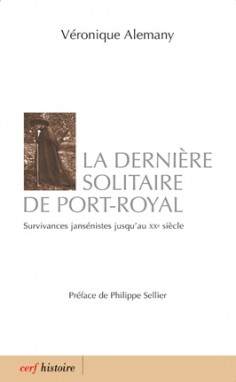
La dernière Solitaire de Port-Royal
Collection Cerf Histoire
688 pages - avril 2013
55,00€
Perpétue de Marsac, devenue en 1865 par son mariage vicomtesse d’Aurelle de Paladines, s’installa à Port-Royal des Champs en juillet 1895, l’année de ses cinquante ans, pour s’immerger dans l’aventure spirituelle des religieuses et des Solitaires et achever, de manière radicale, sa propre conversion. Elle allait y vivre trente-sept ans, suivant les rudes chemins de la pénitence, jusqu’à sa mort en 1932. Elle s’aménagea une cellule de moniale conforme aux exigences de pauvreté des « Constitutions de Port-Royal ». Elle fit venir de Marsac sa riche bibliothèque et s’inscrivit aussi dans la lignée des copistes de Port-Royal, recopiant pour elle-même des documents prêtés, ou pour ses amis des textes qui l’avaient touchée : une mine pour découvrir un jansénisme peu connu, celui de la Petite Église de Toulouse ou des Amis de la Vérité lyonnais. Le milieu toulousain où Perpétue de Marsac s’est formée est celui d’une petite noblesse provinciale, parlementaire, cultivée et d’un légitimiste critique, où règne un jansénisme nourri de celui du XVIIe siècle — avec le primat de saint Augustin, la primauté du concile sur le pape et l’attachement aux libertés de l’Église gallicane — et de celui du XVIIIe ; — avec le figurisme biblique, les convulsions et les visions, l’attente de la conversion des juifs et du retour du prophète Élie. Ce néo-jansénisme est caractérisé par une intense dévotion à la Croix ; il condamne avec virulence le prêt à intérêt et renouvelle la vieille hostilité à la Compagnie de Jésus. On découvre ainsi la personnalité attachante de la dernière Solitaire de Port-Royal et le réseau de ses relations (notamment Augustin Gazier, professeur à la Sorbonne et historien de Port-Royal) qui atteste la survivance de ce jansénisme au XXe siècle.
--
When she married in 1865, Perpétue de Marsac became Vicountess d’Aurelle de Paladines. In July 1895, the year she turned fifty, she went to stay at Port-Royal des Champs, in order to immerse herself in the spiritual adventure of the nuns and the Solitaires there, and to accomplish, in a radical manner, her own conversion. She would spend thirty-seven years there, scaling the stony paths of penitence until her death in 1932. She arranged a monastic cell for herself that conformed to the requirements of poverty as stated in the Port-Royal Constitution. She had her extensive library brought from Marsac and also joined the long line of Port-Royal copyists, personally reproducing documents that had been loaned or making copies for friends of texts that had particularly moved them: an absolute goldmine for those who wish to rediscover neglected aspects of Jansenism, such as la Petite Église de Toulouse or Les Amis de la Vérité lyonnais. Perpétue de Marsac was brought up in a Toulousain milieu of provincial ‘parliamentary’ nobility, cultivated and critically legitimist, dominated by a Jansenism rooted in the 17th century, which proclaimed: — the primacy of Saint Augustine and that of the council over the pope, and an attachment to the liberties of the Gallican Church — and of the 18th century; — biblical Figurism, convulsions and visions, anticipation of the conversion of Jews and the return of the prophet Elijah. This neo-Jansenism is characterised by an intense devotion to the Cross; it virulently condemns usury and renews its old hostility towards the Society of Jesus. In this book, which attests the survival of Jansenism into the 20th century, we discover the appealing character of the last ‘Solitaire de Port-Royal’, the network itself and those related to it (in particular Augustin Gazier, professor at the Sorbonne and historian of Port-Royal).
--
When she married in 1865, Perpétue de Marsac became Vicountess d’Aurelle de Paladines. In July 1895, the year she turned fifty, she went to stay at Port-Royal des Champs, in order to immerse herself in the spiritual adventure of the nuns and the Solitaires there, and to accomplish, in a radical manner, her own conversion. She would spend thirty-seven years there, scaling the stony paths of penitence until her death in 1932. She arranged a monastic cell for herself that conformed to the requirements of poverty as stated in the Port-Royal Constitution. She had her extensive library brought from Marsac and also joined the long line of Port-Royal copyists, personally reproducing documents that had been loaned or making copies for friends of texts that had particularly moved them: an absolute goldmine for those who wish to rediscover neglected aspects of Jansenism, such as la Petite Église de Toulouse or Les Amis de la Vérité lyonnais. Perpétue de Marsac was brought up in a Toulousain milieu of provincial ‘parliamentary’ nobility, cultivated and critically legitimist, dominated by a Jansenism rooted in the 17th century, which proclaimed: — the primacy of Saint Augustine and that of the council over the pope, and an attachment to the liberties of the Gallican Church — and of the 18th century; — biblical Figurism, convulsions and visions, anticipation of the conversion of Jews and the return of the prophet Elijah. This neo-Jansenism is characterised by an intense devotion to the Cross; it virulently condemns usury and renews its old hostility towards the Society of Jesus. In this book, which attests the survival of Jansenism into the 20th century, we discover the appealing character of the last ‘Solitaire de Port-Royal’, the network itself and those related to it (in particular Augustin Gazier, professor at the Sorbonne and historian of Port-Royal).
- Dimensions : 145x235x35
- ISBN : 9782204099516
- Poids : 1020 grammes
Avec la collaboration de : Philippe Sellier






